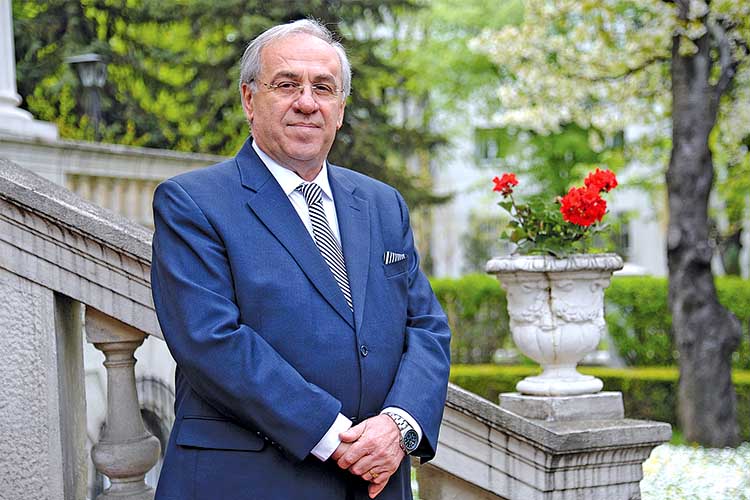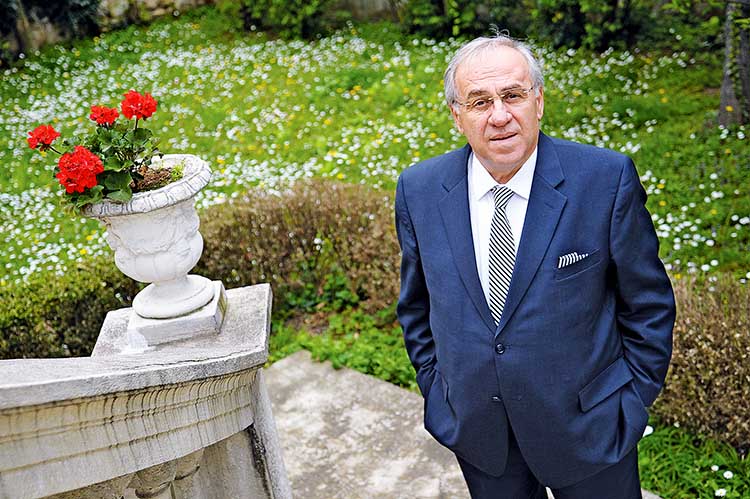The three countries of the Open Balkan Initiative are like those boys from the suburbs whose neighbours don’t permit them to play in their big and beautiful stadiums. We, the small countries of the Western Balkans, have created a local championship, where we train ourselves and play among one another to stay fit for upcoming matches, as well as to combat the stress of the long wait ~ Ilir Boçka
Relations between Albania and Serbia “resemble a construction site with a signpost that reads ‘Work in Progress’,” says Ambassador Ilir Boçka speaking in this CorD Magazine interview. And while the quality of the two countries’ political relations are largely dependent on contrasting views of the situation in Kosovo, on the other side is the impact of the movement of a large number of people in both directions, through tourism, which has brought “positive feelings in human relations and has broken stereotypes,” explains the Albanian ambassador. He insists that it isn’t difficult for him to imagine a day when the citizens of one of our countries will find employment in the other country without major problems, a contribution to which is provided by the regional agreements signed recently.
Your Excellency, in your capacity as ambassador of Albania to Serbia, how do you see the recent signing of several agreements within the scope of the Berlin Process, which should ease mobility and freedom of movement among citizens of the Western Balkans?
– Firstly, thank you for this possibility to be with you. I see this moment, the meeting in Berlin and the agreements signed between the countries of the Western Balkans as a focal point and a return to the real life of the Berlin Process, with the emphasis on addressing some challenges and issues that have been under discussion for a long time. The return of attention to the region of the Western Balkans, especially now in the background of the Russian aggression in Ukraine, seems to be the most normal reaction of Germany and the other countries of the European Union.
Do you believe in the possibility of a future in which Albanians, with recognised diplomas, will gain employment in Serbia, while Serbs will find work in Albania?
Of course, it is a great facility for the realisation of the right to free movement and employment, and this has been in the process of being realised for some time now. For four years, both sides, Albanian and Serbian institutions, have mutually agreed to recognise diplomas and have simplified the procedures, according to well-known European models. Workers and specialists in fields like construction, tourism and transport have begun taking advantage of the opportunities offered by the regional labour market in both Serbia and Albania. The Open Balkan Initiative has also offered a great possibility to have work permits ready in the short term.
Workers and specialists in fields like construction, tourism and transport have begun taking advantage of the opportunities offered by the regional labour market in both Serbia and Albania. The Open Balkan Initiative has also offered a great possibility to have work permits ready in the short term
Some analyses consider initiatives like the Berlin Process and the Open Balkan as a kind of consolation prize for Balkan countries, compensating for the slow process of EU membership negotiations. What is your view?
– It’s true. The feeling of frustration caused by the long wait among the countries of the Western Balkans, as well as the “enlargement fatigue” felt among EU member countries, have been real phenomena for a long time. I will illustrate the similarities or differences between the Berlin Process and the Open Balkan Initiative with a metaphor from the beloved sport of football. The three countries of the Open Balkan Initiative are like those boys from the suburbs whose neighbours don’t permit us to play in their big and beautiful stadiums.

We, the small countries of the Western Balkans, have created a local championship, where we train ourselves and play among one another to stay fit for upcoming matches, as well as to combat the stress of the long wait. Through these initiatives, we learn to “play” and to stand together; we try to show others that we are capable, good and worthy to play together with them in the Champions League. which would be the European Union.
Albania has yet to start formal EU accession negotiations. What do you believe is causing the delay?
– I think that Albania and North Macedonia have already started the negotiation process since July 2022. The state administration in Albania has started seriously working on concrete files that will soon find themselves on the negotiation table.
Does the recently presented European Political Community concept only serve to distance the Western Balkans from EU membership, or does it represent an opportunity to forge new forms of association?
– At the moment, it seems to me that the European Political Community concept is a discussion of a theoretical nature and that it has not yet reached the stage of discussing concrete issues. The real developments around us are rapid and violent and the time demands unity from all, a clear vision, energetic action to face these major existential challenges that have been laid before citizens, states and alliances. Maybe the EU and NATO should consider the Western Balkans in the future as a more important factor in terms of security. Therefore, the same question can be asked in a different way: to keep them close, or rather very close.
It is apparent that both parties understand the reality that opposing positions on issues like Kosovo should not become an obstacle for the advancement of relations between the two countries. In the continuation of this idea, we can say that this new reality of relations between the Republic of Albania and the Republic of Serbia also serves to improve the political climate in the Western Balkan region
Relations between Albania and Serbia are generally viewed through the scope of personal interactions between Prime Minister Edi Rama and President Aleksandar Vučić. With the exception of that relationship, how would you describe current bilateral relations between our countries?
– Relations between Serbia and Albania resemble a construction site where it is written in bold letters “Work in Progress”. In these relations there is movement and dynamism, but also issues. They have the potential to progress, but there is also a problem: Kosovo, as an issue on which both parties have opposing positions. The resolution of this issue and the advancement of the Pristina-Belgrade dialogue will also mark a very favourable moment in the development of relations between Albania and Serbia.

I strongly agree with you when you say that interpersonal interactions between Prime Minister Edi Rama and President Aleksandar Vučić generate positive energy in this process.
In which areas has our cooperation advanced the most; would that be tourism?
– We have very positive indicators in the field of the tourism sector, because the impact of the movement of a large number of people in both directions has brought positive feelings in human relations, has broken stereotypes of the past and has improved the climate of human and business relations etc. The agreements reached within the scope of the Open Balkan Initiative have created opportunities for further development in investments, agriculture and energy.
To what extent is our bilateral cooperation negatively influenced by Albania’s support for Kosovo’s unilaterally declared independence, as well as Albania’s lobbying on behalf of Kosovo in international organisations?
It is true that the subject of Kosovo has been, and remains, a factor that has always influenced our relations. Albania, for reasons that are known, has supported and continues to support the actions of the government of Kosovo to consolidate independence and the state in Kosovo, as well as its efforts on international recognition. This is not a secret. We have tried to ensure that our attitude towards Kosovo doesn’t become an obstacle in the development of bilateral relations between Serbia and Albania.
The voter registration and voting process was conducted in a correct manner and the Albanians of the Preševo Valley, like all other minorities in Serbia, exercised their constitutional right to elect their members in these National Councils
It is apparent that both parties understand the reality that opposing positions on issues like Kosovo should not become an obstacle for the advancement of relations between the two countries. In the continuation of this idea, we can say that this new reality of relations between the Republic of Albania and the Republic of Serbia also serves to improve the political climate across the Western Balkan region.
Do you agree with the assessment of Brussels and Washington, D.C. that a Community/Association of Serb Municipalities must be formed in Kosovo, in accordance with the accepted provisions of the Brussels Agreement?
– As a diplomat, and as ambassador of Albania in Belgrade, I should avoid any discussion of issues that pertain to the sphere of bilateral relations between Serbia and Kosovo. Of course, in principle, I am for seriousness when it comes to the implementation of obligations that arise from the agreements signed in Brussels or elsewhere. I would also state that the product of these agreements should be aligned with the Constitution and the laws of Kosovo, because otherwise it will not work and would create new problems.
What do you expect from the elections for the Councils of National Minorities, which you were familiarised with by the candidates of Albanian political options from Preševo and Bujanovac.
– I followed the census conducted in Serbia in October with great attention. The reason was due to the fact that it captured the registration of the Albanian minority living in the three municipalities of the Preševo Valley in the south of the Republic of Serbia. I heard from observers of international organisations and specialists talking with regard to the positive feedback they gave to the organisers of the census, including with regard to the registration forms in Albanian, the training of census personnel of Albanian ethnicity, as well as the fact that the process was developed correctly in all areas and municipalities where Albanians reside. I wish and hope for the process to be completed in the same way it began. I have also heard from Albanian activists, as well as from foreign observers who are monitoring the registration, that some irregularities were observed in one of the municipalities where members of the Albanian minority live, particularly in Medveđa, where some party officials and administrators of the municipality in question created difficulties in the process, while also contradicting the council and the directives of the authorities of the Statistical Office.
Another important activity involving the Albanian minority was the elections for the National Councils of Minorities, which took place in November. The Albanian minority in the three municipalities participated in the electing of the National Councils. According to foreign observers and official reports, the election process ran smoothly. The voter registration and voting process was conducted in a correct manner and the Albanians of the Preševo Valley, like all other minorities in Serbia, exercised their constitutional right to elect their members in these National Councils. Both activities are so important in the political, economic and social life of minorities.
| EU MEMBERSHIP The feeling of frustration caused by the long wait among the countries of the region, as well as the “enlargement fatigue” felt among EU member countries, have been real phenomena for a long time | SECURITY Maybe both the EU and NATO should, in the future, consider the Western Balkan egion as being a more important factor in terms of overall security | SUPPORT FOR KOSOVO Albania, for reasons that are known, has supported and continues to support the actions of the government of Kosovo to consolidate independence and the state in Kosovo, as well as its efforts on international recognition |
|---|